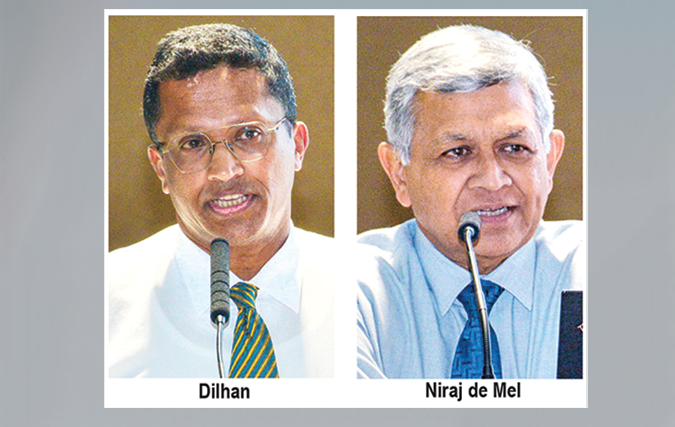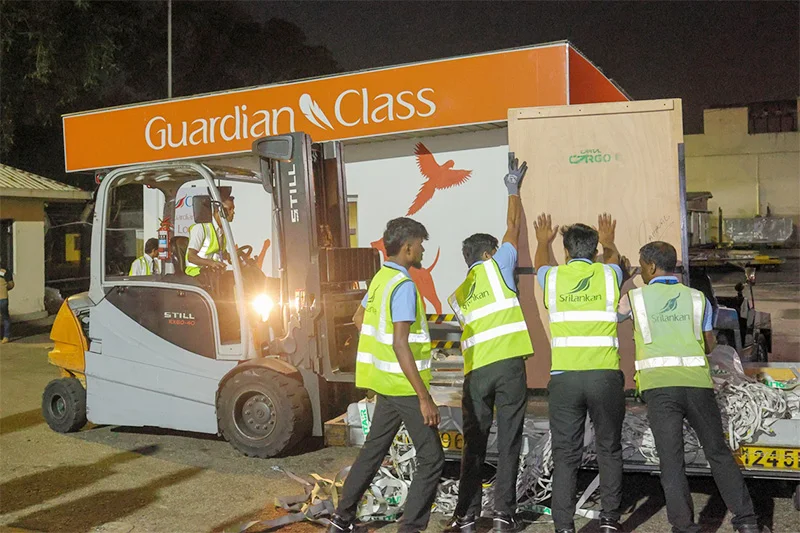Business
Dilmah Tea Invites Industry Collaboration to Strengthen Sustainability & Resilience in Ceylon Tea Industry

With the climate emergency clouding prospects for farmers globally, Dilmah Tea recently invited stakeholders in Ceylon Tea to a collaboration aimed at embedding sustainability and resilience into Sri Lanka’s tea industry, the company said in a news release last week.
“The initiative is linked to wider conservation, restoration and sustainable agriculture efforts by Dilmah Conservation, linked to its Genesis, nature based solutions programme, and its global climate action efforts via the Dilmah Conservation, One Earth Climate Research and Adaptation Centre. The initiative envisages collaboration with Universities and Researchers in strengthening climate resilience on tea plantations through more regenerative forms of agriculture,” it said.
Dilmah Founder Merrill J. Fernando founded Dilmah Tea with emphasis on family values and a commitment to kindness to people and nature. That foundation is reinforced by his lifetime of devotion to Ceylon Tea until he passed away in July last year. In 2012 the family company established Biodiversity Sri Lanka with the intention of escalating its own efforts at Conservation through Biodiversity Sri Lanka into a broader coalition. Recently Merrill J. Fernando’s son Dilhan, now Chairman & CEO of Dilmah Tea, invited stakeholders in the tea industry to a collaboration aimed at driving sustainability in the Ceylon Tea Industry.
The launch event was held on December 1, 2023 at Dilmah’s ‘Founder’s Auditorium’, where 128 Regional Plantation Companies and representatives of tea smallholders convened. The meeting aimed at collectively addressing concerns and actions towards mitigating threats to the shared future of the tea industry. The focus was on the opportunity in greening the plantations, by supporting livelihoods and strengthening sustainability while mitigating the effects of increasing climate extremes. The opportunity for Ceylon Tea lies in building on sustainability to meet growing demand, strengthen livelihoods and consumer appeal while minimizing environmental impact. The theme of the gathering reflected the reality of a shared future, “Stronger Together,” the release said.
In July 2023, a similar initiative was launched to support sustainability among packaging material manufacturers -the Dilmah – MJF Sustainable Supply Chain Road Map focuses on strengthening capacity of small and medium packaging companies in the area of sustainability. While inviting collaboration for positive change, Dilmah offered support to colleagues and competitors in the industry, it added.
“Sustainability is too often viewed as a cost, when it is in reality an opportunity that builds resilience, strengthens consumer engagement and ensures the survival of businesses that take sustainability seriously,” stressed Dilhan C Fernando. He added that while Dilmah Conservation had worked on conservation, restoration, climate action and sustainable agriculture since 2007, the Stronger Together initiative was aimed at extending those benefits across the Sri Lanka Tea Industry.
Key figures in the tea industry and biodiversity, including Niraj De Mel, Chairman of the Tea Board, Vihagun Ariyarathne, CEO of Owita Naturals, Anil Cooke of Asia Siyaka Commodities PLC, Prof Enoka Kudavidanage, Conservation Biologist, addressed the event.
Niraj De Mel, Chairman of the Tea Board has been vocal in the past about the role of smallholder growers in the industry and need to reach production goals, particularly in the areas aligned with the Sustainable Development Goals (SDGs). At the event, he also emphasized the relationship between the tea industry and sustainability explaining – “we have destroyed that tea bush by going away from the sustainability code and thereby come into the situation where we say we cannot achieve B60 (leaf programme route).Don’t blame it on the weather and the lack of input – we have moved away from basics. If we are to be sustainable, we need to look after the tea bush and that is the only way we can also get into the top end of the tea market.”
Ceylon tea marks 157 years since its inception with a Colombo Tea Convention this year. The uniqueness of the industry has ensured its survival through turbulence, industry change, and transformation while preserving the identity as a universally loved beverage. Dilmah invited the gathered tea plantation community to submit their proposals aligned with carbon emission reduction or higher education opportunities for children in the plantations. After a transparent evaluation, Dilmah’s MJF Foundation will support the most impactful proposals.
In fulfilling Merrill J. Fernando’s pledge to make Dilmah a business that serves humanity, the company continues to use a minimum of 15% of its pre-tax profits for kindness to people and nature, via the MJF Foundation and Dilmah Conservation.
The environmental and humanitarian efforts of both are documented in ‘Impact,’ an e-publication that can be accessed online [https://issuu.com/dilmah/docs/impact_2022_family_business_serving_humanity]. Stronger Together is a significant component in this effort, combining environmental and humanitarian priorities in a collaboration that will strengthen the foundation of Ceylon Tea for the next century.
Business
Pan Asia Bank’s overall assets soar over Rs. 300 Bn and achieve a PAT of Rs.4 Bn

Pan Asia Banking Corporation PLC reported a strong financial performance for 2025, marking a year in which the Bank reinforced its position among Sri Lanka’s steadily expanding financial institutions. The Bank’s overall asset base surpassed Rs. 300 Bn, reaching Rs. 308.02 Bn its largest balance sheet to date while Profit After Tax amounted to Rs. 4.01 Bn. Earnings Per Share stood at Rs. 9.05, reflecting a solid core earnings base and disciplined balancesheet execution during a year of gradually easing macroeconomic pressures.
Total operating income grew to Rs. 16 Bn, supported by resilient net interest generation and sharp growth in non-interest revenue. Even though benchmark interest rates trended downward for much of the year reducing gross interest income at the market level, the Bank protected its core income through proactive liability repricing, careful funding management, and the retirement of high-cost borrowings. A healthier deposit mix supported by CASA growth helped reduce interest expenses by 4%, allowing the Bank to maintain profitability despite softer yields on loans and government securities.
A clearer picture of Pan Asia Bank’s true performance emerges once the nonrecurring sovereign debt gain recorded in 2024 is set aside. On this normalized basis, 2025 stands out as the Bank’s strongest year of underlying profitability in its 30-year history. Underlying Profit After Tax surged 35% to Rs. 4.01 Bn, while underlying Profit Before Tax climbed an impressive 52%, highlighting the Bank’s accelerating earnings momentum. Underlying EPS rose 35% to Rs. 9.05, supported by improved returns, with underlying ROE and ROA rising by 169 and 52 basis points, respectively. Together, these gains reflect the depth of the Bank’s core business strengths, broadbased revenue growth, and disciplined margin management during a year shaped by declining interestrate conditions.
Income diversification also played a pivotal role. Net fee and commission income expanded by 37%, supported by heightened lending activity, improved trade flows, stronger card-related transactions, and remarkable growth in remittance-related business. These developments helped offset the moderation in trading gains, which were affected by lower capital gains on unit trusts and government securities. A derecognition gain of Rs. 278.63 million on FVOCI assets and reduced marktomarket losses helped stabilize noninterest income, allowing the Bank to sustain earnings despite a more subdued trading environment.
Credit quality improved significantly. The Stage 3 loan ratio declined to 1.73% from 3.10% a year earlier one of the greatest improvements within the sector—reflecting the Bank’s continued emphasis on highquality underwriting, better borrower monitoring, and an effective earlywarning framework. Impairment expenses normalized following the unusually large reversal seen in 2024. ( Pan Asia Bank)
Business
SriLankan Cargo secures another South Asian First with IATA CEIV Live Animals Certification

SriLankan Cargo, the air freight arm of SriLankan Airlines, has secured another regional first by becoming the first airline in South Asia to be awarded the Center of Excellence for Independent Validators (CEIV) for Live Animals Logistics Certification from the International Air Transport Association (IATA). Regarded as the premium global standard for the air transport of live animals, the certification serves as a powerful pledge to pet parents, livestock owners, conservationists and all shippers that SriLankan Cargo will transport animals in humane, safe and stress-free conditions across its worldwide network.
Chaminda Perera, Head of Cargo at SriLankan Airlines, commented on the achievement, stating, “Earning the IATA CEIV Live Animals Certification underscores our dedication to animal welfare and operational excellence, ensuring safer handling, trained teams and peace of mind for our customers.”
Sheldon Hee, Regional Vice President, Asia-Pacific, said, “The CEIV Live Animals certification is not only about compliance, but ensures the safety and welfare of live animals transported by air. This is particularly relevant as this is a market that continues to grow with more than 200,000 live animal shipments globally in 2025. We are pleased to see SriLankan Airlines achieve this important certification and ensure the implementation of the highest standards across the supply chain.”
The certification stands out for placing animal safety and welfare at the forefront, supported by best-in-class infrastructure and operational excellence. Achieving it requires a rigorous, multi-step process of training, assessment, validation, certification and recertification, ensuring that only organisations fully compliant with the IATA Live Animals Regulations and the Convention on International Trade in Endangered Species gain membership in this highly exclusive circle of airlines, which currently numbers 12 worldwide.
SriLankan Cargo remains firmly committed to upholding the highest standards stipulated in the IATA Live Animals Regulations throughout the shipment lifecycle, from acceptance and handling to loading, transportation and final delivery. Working closely with veterinary authorities, ground handlers and cargo partners, the airline ensures every check box relating to welfare and compliance is consistently ticked.
SriLankan Cargo also operates purpose-built facilities with precise temperature control procedures and robust contingency plans, enabling animals to travel in optimal conditions, including during transit. Dedicated CEIV-trained team members oversee each movement, safeguarding comfort, wellbeing and regulatory adherence at every stage.
Business
Prime Lands Residencies reports strong earnings growth

Prime Lands Residencies PLC (CSE: PLR) reported strong financial performance for the quarter ended 31 December 2025, keeping shareholder expectations intact.
The company’s share price increased by more than 40% over the last three months, reflecting heightened investor confidence. Market expectations remained elevated given the scale of project launches over the past two years, including three towers in The Border Colombo (484 units), J’adore Negombo (333 units), The Golf Colombo 08 (64 units), Mon Vie Colombo 05 (349 units), Prime Colombo 9 (559 units), and The Seasons Colombo 08 (44 units).
Quarterly revenue grew by 43% year-on-year to Rs. 2.80 billion, compared to the corresponding period last year. This growth was primarily driven by accelerated construction progress in Towers C of The Border Colombo project, together with first time revenue recognition from The Seasons Colombo 08. Revenue from the newly launched remaining projects is yet to be recognized in line with construction milestones and the company’s prudent revenue recognition policy, establishing the growth potential in earnings in upcoming periods.
-

 Life style4 days ago
Life style4 days agoMarriot new GM Suranga
-

 Business3 days ago
Business3 days agoMinistry of Brands to launch Sri Lanka’s first off-price retail destination
-

 Features4 days ago
Features4 days agoMonks’ march, in America and Sri Lanka
-

 Opinion7 days ago
Opinion7 days agoWill computers ever be intelligent?
-

 Features4 days ago
Features4 days agoThe Rise of Takaichi
-

 Features4 days ago
Features4 days agoWetlands of Sri Lanka:
-

 News4 days ago
News4 days agoThailand to recruit 10,000 Lankans under new labour pact
-

 News4 days ago
News4 days agoMassive Sangha confab to address alleged injustices against monks















